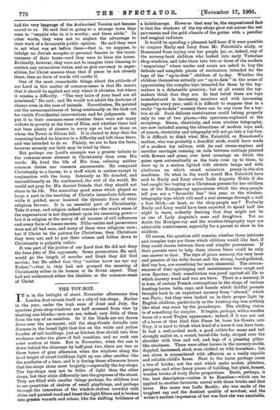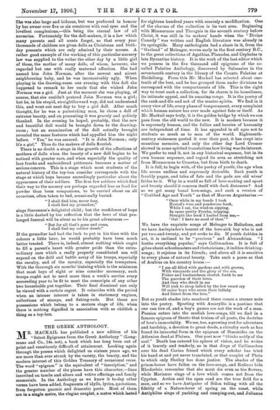THE TOY-BOX.
IT is in the twilight of short November afternoons that London first reveals itself as a city of toy-shops. Earlier in the year, under the high suns of June and July, the spacious glass shop-windows are half screened from view by slanting sun-blinds,—you can see, indeed, very little of them from the top of an omnibus. Or if the blinds are not drawn down over the pavement, still the shop-fronts dwindle into dimness in the broad light that lies on the white and yellow façades of tall buildings, just as kitchen fires shrink into blue weakness under the glare of full sunshine, and no cook can roast mutton at them. But in November, when the sun is down behind the chimneys by half-past two, there are two or three hours of grey afternoon when the windows along the level height of street buildings light up one after another like the portholes of a liner, and it is during those afternoon hours that the shops shine most brightly,—especially the toy-shops. The toy-shops may not be fuller of light than the other shops, but they shine differently into the greyness of the street. They are filled with smaller things perhaps, for children love to see quantities of shelves of small playthings, and perhaps through the interstices of the window-shelves crowded with china and painted wood and tinsel the light filters and is broken into greater warmth and colour, like the shifting brilliance of a kaleidoscope. However that may be, the unquestioned fact is that the windows of the toy-shops glow out across the wet pavements and the gold ribands of the gutter with a peculiar and magical radiance.
It would be spending a pleasant half-hour if it were possible to conjure Emily and Lucy from Mr. Fairchild's study, or Rosamond from crying over her purple jar, or, indeed, any of the nursery-book children who looked into early Victorian shop-windows, and take them into two or three of the modern " emporiums " where uncles and aunts are asked to buy the delicate and complete pieces of mechanism intended for the toys of the "up-to-date" children of to-day. Whether the children themselves actually are " up-to-date " in the sense of appreciating the complex toys intended for them by the toy- makers is a debateable question; but at all events the toy- makers think that they are. In that belief there are toys manufactured in increasing numbers and with increasing ingenuity every year, until it is difficult to suppose that in a really " up-to-date" nursery there can be any room for a toy- box at all. Such delicate contrivances could belong properly only to one of two places,—the specimen-cupboard or the scrapheap. Steam, electricity, and even wireless telegraphy, are now included among the attractions of modern toys, and, of course, electricity and telegraphy will not go into a toy-box. It is difficult to think what Mrs. Fairchild, or Rosamond's mother, who was probably a dreadful stick, would have made of a modern toy railway, with its real steam-engines and corridor carriages running on rails between cuttings planted with flowers and grass, over level crossings on which the gates open automatically as the train runs up to them, to draw up in a station lighted with electric lamps and with platforms on which stand miniature penny-in-the-slot machines. Or what in the world would Mrs. Fairchild have said to Emily and Lucy about Lady Augusta Noble if she had caught her buying as a Christmas present for her children one of the Röntgen-ray apparatuses which the shop-people tell you are a " favourite line" this year, or the wireless- telegraphy toys which will send a real message through a wall a foot thick,—at least, so the shop-people say Probably Emily and Lucy would have been expected to spend half the night in tears, ardently desiring that they might not he as one of Lady Augusta's sons and daughters. Yet no doubt the Röntgen-ray and the wireless-telegraphy toys are admirable contrivances, especially for a parent to show to his children.
Of course, the question still remains whether these intricate and complex toys are those which children would like best, if they could choose between them and simpler possessions. If their parents were to help them choose, there could be only one answer to that. The toys of pious memory, the very lares and penates of the dolls'-house and the strong, band-polished, deal toy-box, are something far more elemental. The circum- stances of their upbringing and maintenance were rough and even Spartan ; their constitution was proof against all ills to which nursery wood and wax are heirs. There is a memory, it is true, of certain French contraptions in the shape of various hunting-horns, belts, caps, and tassels which dutiful parents brought back to an expectant nursery from "abroad," which was Paris ; but they were looked on in their proper light by English children, particularly as the hunting-cap was nothing like what was worn by the gamekeeper. The abiding vision is of something far simpler. It begins, perhaps, with a wooden horse of a most Trojan appearance; indeed, if it was not out of a horse of that kind that Sinon let loose his Greeks into Troy, it is hard to think what kind of a horse it can have been.
It had a well-arched neck, a good rabbit-fur mane and tail strongly nailed on, a sound, barrel-like body, striped over the shoulder with blue and red, and legs of a pleasing pillar- like stoutness. Them were other horses in the nursery-stable, dappled, harnessed, shod, even clothed on with horsehair ; but one alone is remembered with affection as a really capable and reliable child's horse. Next to the horse perhaps came a box of bricks ; not the sort which make arches, pilasters, parapets, and other fancy pieces of building, but plain, honest, wooden bricks of truly Doric proportions. Doric, perhaps, is the best description—unless it be Boeotian—which can be applied to another favourite coeval with those bricks and that horse. Her name was Lalla Rookh ; she was made of the toughest rag and the dustiest quality of sawdust, and the writer's earliest impression of her was that she was uneatable.
She was also large and hideous, but was preferred in honour by her owner over five or six creatures with real eyes and the levelieet complexions,—this being the eternal. law of all nurseries. Fortunately for the doll-makers, it is a law ' which many parents and all aunts forget, , so that every year thousands of children are given dolls as Christmas and birth- day presents which are only admired by their nurses. A rather good example of the working of this particular nursery law was supplied to the writer the other day by a little girl of three, the mother of many dolls, of whom, however, she regarded but one with really maternal affection. She had named him John Norman, after the newest and nicest neighbouring baby, and he was inconceivably ugly. When playing in the drawing-room one evening with this doll she .happened to remark to her uncle that she wished John Norman was a girl. Just at the moment she was playing, of course, that she couldn't pretend John Norman was a girl; but he, in his stupid, straightforward way, did not understand this, and went out next day to buy a girl doll. After much thought, for he was a painstaking man, he chose a doll of extreme beauty, and on presenting it was gravely and politely thanked. In the evening he hoped, probably, that the new and beautiful doll would be brought down to the drawing- room ; but an examination of the doll actually brought revealed the same features which had appalled him the night before. " Yes," he was assured. " It is John Norman ; only it's a girl." Thus do the makers of dolls flourish.
There is no doubt a stage in the growth of the affections of mothers of dolls when the beauty of a new doll begins to be noticed with greater care,. and when especially the quality 'of lace frocks and embroidered petticoats becomes a matter of serious concern. This is a stage which most students of the natural history of the toy-box consider corresponds with the stage at which boys become exceedingly particular about the appearance of their soldiers. The first few soldiers which find their way to the nursery are perhaps regarded less as food for powder than boon companions, to be carried about on all occasions, often taken to bed, occasionally buried.
" I shall find him, never fear,
I shall find my grenadier,"
sings Stevenson's delightful child ; but the confidence of hope is a little dashed by the reflection that the hero of that pro- longed funeral will be silent as to his great adventures :—
" But for all that's gone and come,
I shall find my soldier dumb."
If the grenadier had had the luck to put in his time with the colours a little later, he would probably have been much better treated. There is, indeed, almost nothing which ought to fill a parent's heart with greater pride than the extra- ordinary care which a really properly constituted son will expend on the drill and battle array of his troops, especially the cavalry, and of the cavalry, especially the trumpeters. With the thorough six months' training which is the minimum that most boys of eight or nine consider necessary, such troops ought not to need more than a week's service every succeeding year to be fit to meet the conscripts of any other two households put together. Their final dismissal can only be viewed with a certain regret. It coincides with the period when an intense interest is taken in stationary engines, collections of stamps, and fishing-rods. But those are possessions which belong to a mature stage of life, when there is nothing dignified in association with so childish a thing as a thy-box.



























































 Previous page
Previous page